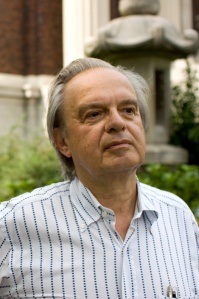 Before joining the Department of Italian at Columbia University, where he became the Giuseppe Ungaretti Professor in Italian Literature in 2005, Paolo Valesio retired as an emeritus professor from Yale University, where he taught for more than a quarter century, and where for most of this period he was Chair of the Italian Department. Prior to that he taught at New York University, after having studied general linguistics and literature at Bologna University and Harvard University. He has been a Fellow of the Center for the Humanities at Wesleyan University, a Fellow of the Guggenheim Foundation, and a Fellow of the Whitney Humanities Center at Yale University. He has also been honorary president of the American Association of Italian Studies.
Before joining the Department of Italian at Columbia University, where he became the Giuseppe Ungaretti Professor in Italian Literature in 2005, Paolo Valesio retired as an emeritus professor from Yale University, where he taught for more than a quarter century, and where for most of this period he was Chair of the Italian Department. Prior to that he taught at New York University, after having studied general linguistics and literature at Bologna University and Harvard University. He has been a Fellow of the Center for the Humanities at Wesleyan University, a Fellow of the Guggenheim Foundation, and a Fellow of the Whitney Humanities Center at Yale University. He has also been honorary president of the American Association of Italian Studies.
Some of his most recent course offerings include the following:
Italian Tales
The course examines the important Italian contribution to modern and contemporary narrative, especially in the genre of short narrative (short story, novella), with attention also to novels, combining narrative theory with close reading.
Authors include A. De Céspedes, E. Morante, as well as S. Vassalli, D. Del Giudice, P. V. Tondelli, etc. Lectures in English, texts in Italian.
The Theory and Practice of Writing I:
Laboratorio di scrittura
Development of advanced reading and conversational skills. Close reading and extensive practice writing in a variety of genres which will include: the letter, the diary, the essay, the critical review, and will focus especially on the composition of short stories and vignettes.
In Italian.
Gabriele d’Annunzio:
Between Two Centuries
The course examines the exceptional contribution of d’Annunzio to Italian literature as it moves from late nineteenth century symbolism to early twentieth century modernism. While all the genres illustrated by this prolific author will be sampled (newspaper article, short story, drama, novel, narrative notebook, memoir, private letter, critical and political essay, diary), special attention will be paid to his poetry.
In Italian.
The Theory and Practice of Writing II:
Laboratorio di traduzione
Experiments and analyses of translations, especially from literary texts, from English into Italian and from Italian into English. Classroom discussion of aspects of the translation process, and of the general interpretation of the translated texts. Each student will keep a “Translation Notebook.”
In Italian.
Futurism and Beyond:
F.T. Marinetti’s Poetry, Narrative, and Drama
Filippo Tommaso Marinetti, the founder of Futurism (arguably the first great avant-garde movement in modern European literature), is also one of the most remarkable writers of the Italian 20th century in his own terms. The course will explore Marinetti’s basic contribution to modern Italian literature. Available editions as well as the typescripts of forthcoming books will be used. Marinetti’s epoch-making contribution will also be studied in a comparative European and American context. Lectures in English, most texts in Italian, some in French; open also to comparative literature students who can read Italian and French with the help of translations.
Lectures are in English, most texts in Italian, some in French, although comparative literature students who can follow with the help of translation are welcome.
A Stray Branch of Laurel:
Venice and Literary Modernity
In the enormously broad context of what has been called the “eternal pilgrimage” to Italy, even when concentrating on a single city does not by itself guarantee a specific focus – especially when examining a city as culturally, historically, and spiritually rich as Venice.
To at least partially solve this problem, this course concentrates on the modern period (from the late 18th century to today) and focuses on two dialectic contrasts: that between the public domain (strategically powerful historically visions) and the private dimension (intricacies of everyday emotions); and the contrast between the Italian and the foreign literary observer. The arc of the course begins with the period of elegance and decadence of the Serenissima in the late 18th century and concludes with the case of a contemporary novelist writing between Venice and the United States.
Authors read in the course will include: Goethe, Voltaire, Giacomo Casanova, Ugo Foscolo, Frederick Rolfe, Camillo Boito, Henry James, Gabriele d’Annunzio, F. T. Marinetti, P. M. Pasinetti, and others.
